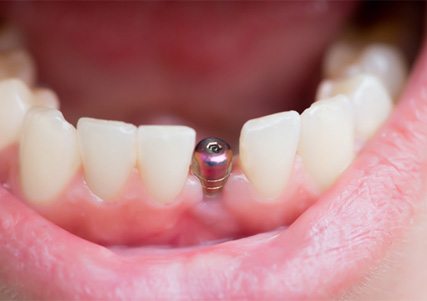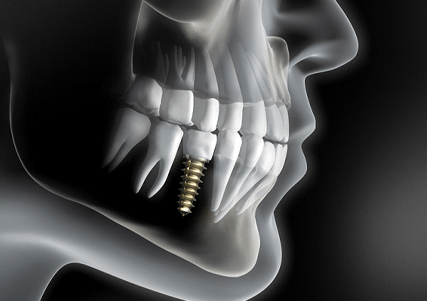
Dental Implants — Saginaw, TX
The Most Comprehensive Solution to Tooth Loss
While there are many ways to replace teeth, there is currently only one solution that effectively replaces the tooth to the absolute fullest. People don’t realize how large of a role the roots of teeth play in restoring your smile’s basic functions. If you want chewing to feel natural or reduce the premature signs of aging that accommodate tooth loss, then dental implants are likely the most appropriate tooth replacement option for you. Dr. Renkuntla can restore your smile to the fullest, whether you’re missing one tooth or an entire arch. Contact his dental office to learn more about the process!

Why Choose Saginaw Dental for Dental Implants?
- Start-to-Finish Dental Implant Treatment
- Digital Impressions System Improves Restoration Process
- Accepts All Major PPO Insurance Plans
What Are Dental Implants?

A dental implant is a prosthetic tooth that’s surgically inserted into the jawbone, designed to replace the entire structure of a missing tooth from the root up to the chewing surface. Since it’s made of biocompatible titanium, it will naturally fuse with the surrounding bone tissue over time via a process called osseointegration. After a few months, you’ll return to our office to have a crown, bridge, or denture attached to your implants. Once you’re all healed up, your results will appear and function just like natural teeth!
The 4-Step Dental Implant Process

Unlike other tooth replacement solutions, dental implants involve a multi-step approach to rebuilding missing teeth. During your initial visit, our team can walk you through the treatment plan so that you know what to expect when completing your smile. Although each patient’s procedure might be slightly different, here are the four main steps of the dental implant process.
Initial Dental Implant Consultation

The first part of your treatment plan will involve a consultation where we will go over your oral health and your situation to determine if you’d be eligible for dental implants. This usually involves seeing if your gums and jawbone are healthy and strong enough to support the metal posts. In some instances, a patient might require preliminary services to prepare their mouth for the procedure. These could include gum disease treatment, bone grafting, or tooth extractions depending on your specific condition. Once we’re able to improve your smile, we can move forward with creating a proper plan for providing your dental implants.
Dental Implant Surgery

Instead of scheduling our patients with a local specialist nearby, our team can perform the entire dental implant procedure in the office. Before starting your treatment, we’ll administer a local anesthetic to keep you comfortable and pain-free during your appointment. Once we’ve confirmed that you’re good to go, we’ll start the process by making small incisions in the gums to access the jawbone underneath, where we will embed the titanium posts at the pre-planned locations and angles before suturing your gums around them. Afterward, we’ll have your trusted friend or relative take you home so that you can rest.
Dental Implant Osseointegration & Abutment

Dental implants typically require three to six months of recovery, meaning you’ll need to focus on keeping your metal post undisturbed and free of bacteria. Your new tooth root will also need to undergo osseointegration, which is the process of fusing with the jawbone to create the lifelike stability needed to support your new pearly whites. Once this is properly completed, you’ll return to our office to receive your abutment, or small metal connector piece that links the restoration to your dental implant. You’ll then need your gums to heal before you can receive your final results.
Delivery of Dental Implant Restoration(s)

After you’ve healed, you’ll come back to our team to get your brand-new dental crown, bridge, or denture. We will verify that your bite is correct and that you’re satisfied with the final results. We’ll also provide you with a guideline on how to make the most of your new smile in the long run.
Benefits of Dental Implants

Why are dental implants becoming increasingly popular as a solution for missing teeth? It’s thanks to the many unique advantages they provide! Unlike dentures that rest on your gums or dental bridges that use your teeth for support, dental implants are placed inside your jawbone. As a result, they offer several benefits for your health and quality of life that other options simply can’t match.
Below are just some of the reasons why so many people are choosing dental implants.
Day-to-Day Benefits

- Able to Handle All Your Favorite Foods: Traditional dentures can slip when you’re trying to chew, which can make eating certain foods difficult. Meanwhile, dental implants are nearly as strong and stable as your natural teeth, allowing you to enjoy your favorite meals without issue.
- Easy to Take Care Of: Dental implants can be brushed and flossed much like your natural teeth, meaning you won’t have to make any major changes to your oral hygiene routine to protect your new smile.
- Can Improve Your Confidence: Because dental implants look and feel like natural teeth, you’re less likely to have reservations about showing them off, which can help boost your self-esteem.
Health Benefits

- Can Help Maintain a Strong Jawbone: When natural teeth are missing, you may experience bone loss in your jaw. However, dental implants can stimulate the jaw to prevent it from deteriorating, thus keeping it strong and healthy in the long term.
- Can Prevent Dental Drift: Empty space in your mouth can cause your remaining teeth to drift, disrupting the balance of your bite. Dental implants fill in any gaps in your grin and ensure that your natural teeth stay in their proper places.
- Can Encourage Better Nutrition: Since dental implants don’t put a limit on your diet, you’ll find that it’s much easier to enjoy a wide variety of nutritious foods to keep your body in good shape.
- Can Improve Oral Health: Because cleaning dental implants is so simple, they can potentially lower your risk for gum disease and other oral health issues.
Long-Term Benefits

- Have a High Success Rate: Dental implants have an extremely high success rate of 95%, thanks in no small part to the many steps that dentists take to keep the risk of complications to a minimum. Even 10 years after the initial placement, you can expect your implants to be as effective and reliable as ever.
- Can Help You Maintain a Youthful Appearance: A deteriorated jawbone can cause your face to collapse, resulting in a sunken, aged look. However, dental implants help preserve your jawbone so that it can continue to support your facial structure, thus helping you look younger in the long term.
- Have a Long Lifespan: Traditional bridges and dentures normally have to be replaced after a few years. Meanwhile, dental implants can last for decades as long as you take good care of them. In fact, it’s not unusual for a patient to keep the same implants for the rest of their life.
Who Dental Implants Can Help

It doesn’t matter if you need to replace a single tooth or all the teeth in your smile; dental implants may be the solution you’ve been looking for! Below, you’ll find some helpful information on this state-of-the-art tooth-replacement solution, including the qualities we look for in a good candidate. However, you shouldn’t hesitate to schedule an appointment with our dental implant dentist in Saginaw if you want to learn more!
Who Is a Good Candidate for Dental Implants?

During your consultation, we will spend time getting to know you, your dental needs, and your smile goals to determine:
- If your jawbone is strong enough to support dental implants
- If your gums are healthy and infection-free
- If you are committed to healthy habits, including brushing consistently
- If you are willing to break bad habits, like smoking
Once we have all of this information, we can determine if you’re a good candidate for dental implants. The good news is that, if you aren’t initially, we can usually provide the necessary preliminary care. Otherwise, we can rebuild your smile with one of the other tooth-replacement solutions we offer, like dentures.
Missing One Tooth

Replacing a single tooth takes just one titanium dental implant and one porcelain crown that sits on top. The two components are attached via an abutment, which is a small connector that keeps the crown stable. Since only the best materials, like dental porcelain, are used, you’ll enjoy added stability and reliability as well as aesthetics. In fact, with proper care, you can enjoy the results for several decades!
Missing Multiple Teeth

Are you missing several teeth in a row? If so, ask us about implant bridges! This restoration secures the prosthetic teeth in place with a pair of dental implants. There are several benefits that come with this cutting-edge tooth-replacement solution, including that you don’t have to remove existing tooth enamel to hold the bridge securely in place.
Missing All Teeth

Whether you need a full or partial denture that is removable or fixed, dental implants can properly hold it in place. There’s no need for denture adhesive and no reason to worry about your denture shifting out of place, either! Plus, every part of your restoration is custom-made with your face shape, dental needs, and aesthetic goals in mind, which ensures that it looks as great as it feels.
LEARN MORE ABOUT IMPLANT DENTURES
If you are struggling with tooth loss and are interested in finding out if you’re a good candidate for dental implants, then there’s only one thing left to do: schedule a consultation with us! We look forward to learning all about your dental needs and how we can give you the healthy, complete, and confident smile that you deserve.
Understanding the Cost of Dental Implants

At Saginaw Dental, we want all our patients to achieve their best smiles without fearing outrageous bills. There isn’t a flat rate for dental implants because various factors affect the final price tag, like the number of teeth you’re missing. Don’t let the cost of dental implants in Saginaw stand in your way of a complete smile because they are more affordable than you might realize. We offer the financial solutions you need to enjoy the unmatched advantages of dental implants.
Preliminary Treatments & Dental Implant Surgery

Although no two treatment plans are the same, the steps to replace teeth with dental implants are virtually unchanged. It can take several months to complete the process, which gives you more time to pay because the entire balance won’t be due upfront. Generally, you can expect to pay for:
- Preparatory Treatments : Many patients need prep work, like tooth extractions, bone grafting, or periodontal therapy.
- Implant Placement : Oral surgery will also include the cost of sedation or anesthesia.
- Restorations : The type of restoration affects the cost, like a crown, bridge, or denture.
You’ll know exactly what you’ll have to pay before committing to anything, so you won’t be surprised by any unexpected fees.
The Parts of Your Dental Implant

A dental implant recreates the entire tooth from the root up. If you’ve lost several teeth, you will require more dental implants, so you can expect to pay more for each part, which includes:
- Implant Post : A post is surgically placed into the jawbone to serve as a root.
- Abutment : Each post needs an abutment to attach the restoration.
- Restoration : Natural-looking material mimics the surfaces of your teeth.
Although there are discounted materials, you’ll get what you pay for. Your implant dentist in Saginaw will help you choose the best materials for your new smile to ensure your investment looks its best and lasts for decades.
How Dental Implants Can Save You Money

Traditional prosthetics need to be replaced every few years, but not dental implants. They can last for 30 years or longer with the right care, so they can pay for themselves over time. Dental implants also improve your oral health to protect against common issues associated with tooth loss. You’ll avoid dental treatments down the road to reduce your overall oral health expenses.
Does My Dental Insurance Cover Dental Implants?

Many dental insurance plans can be used to offset the cost of certain steps in your treatment. After reaching your deductible, your plan can cover up to 80% of the cost until hitting your yearly limit. We’ll help you maximize your coverage to lower your out-of-pocket expenses, so you have one less thing to worry about.
Making Dental Implants Affordable

We believe everyone should have a healthy, beautiful smile, even if money is tight. We offer multiple payment options to keep dental implants within your budget, including:
- Traditional Payments : Cash, checks, and credit cards.
- Patient Specials : Ask us about any current patient specials, like a free consultation.
- Third-Party Financing : Pay for your new smile in monthly installments.
Maintaining & Caring for Your Dental Implants

Dental implants are highly durable and can last for decades. However, they are not infallible and could still potentially fail due to damage or infection. If you want to protect your dental implants, you need to learn how to take proper care of them. Below is a closer look at some basic precautions you can take that can ultimately help your dental implants last as long as possible.
Make Oral Hygiene a Priority

If you aren’t diligent about maintaining good oral hygiene, harmful bacteria could accumulate around your implant posts. This can eventually lead to an infection that could ultimately compromise your dental implants. Fortunately, keeping the area around your replacement teeth clean is as simple as brushing and flossing thoroughly twice a day; it’s often worth rinsing with an antibacterial mouthwash as well.
Eat a Healthy Diet

Eating too many sugary or starchy foods can significantly increase your risk for gum disease and other oral health issues that could easily cause problems for dental implants. As such, you should pay close attention to what you’re eating so that you can maintain a healthy oral environment where your implant posts can thrive. Try to limit your intake of sugar and starch as much as possible; instead, focus on eating more foods that are good for your mouth, such as various fruits, vegetables, and dairy products.
Break Bad Habits

When you finish a drink, do you sometimes eat the ice that’s left over? Do you often find yourself chewing on your fingernails when you’re anxious? Do you routinely tear open packages with your teeth? All of these habits can put unnecessary pressure on your dental implants and significantly damage them in the long run. To protect your smile, it’s a good idea to review any potentially harmful oral habits you might have and take whatever steps you can to break them.
Protect Your Dental Implants

Even the sturdiest dental implants could break if you get hit in the mouth while playing your favorite sport. For the sake of keeping your newly rebuilt smile safe, you should always wear a mouthguard when you’re on the field or court, even if it’s not a requirement.
Additionally, if you grind or clench your teeth at night, it’s highly recommended that you start wearing a nightguard; this will help protect your dental implants from unnecessary damage while you sleep.
Schedule Regular Dental Checkups

Dental implants may not be real teeth, but it’s still important to have a dentist take a look at them every once in a while to make sure they’re still in good shape. To that end, you should make a point of visiting our office at least twice a year for regular checkups and cleanings. If our team finds anything wrong with your dental implants, we can take steps to address the issue before it has a chance to lead to more severe complications.
Dental Implants Post-Op Instructions

Our team at Saginaw Dental can perform and complete your entire dental implant placement at our office. Once we’ve completed your procedure, you’ll be provided with certain post-op instructions that will help promote a smooth and comfortable healing process. While you’ll be informed on the best practices for optimal recovery before and after your appointment, here are the essential guidelines you can expect to follow.
What to Do Directly After Dental Implant Surgery

One of the main priorities during your healing process is to leave the blood clot around your dental implant(s) undisturbed. There are several ways you can help make this recovery period smoother, such as:
- Keep away from smoking or using tobacco products for a couple of weeks.
- Avoid spitting; use tissues or swallow any saliva instead.
- Refrain from touching the surgical site(s) with your tongue or fingers.
- Avoid using a straw when drinking.
Common Side Effects When Recovering from Dental Implant Placement

While every patient is different, many share some of the same experiences when healing from dental implant placement surgery. Some of the common symptoms include:
- Soreness – Patients will typically feel sore around the implant site for a few days. Take over-the-counter/prescribed pain relievers as needed.
- Swelling – Your gums may become mildly swollen for several days following your appointment. This can be alleviated with a cold compress.
- Bleeding – It’s normal to experience intermittent bleeding after oral surgery. Try using clean gauze pads and apply light pressure to control the situation. This should be short-lived.
Your Diet After Dental Implant Surgery

Since you’ll want to avoid disturbing the surgical site(s), you’ll need to avoid consuming food that is difficult to chew or that can accidentally harm your implants. Once you’ve healed sufficiently, you’ll be able to return to eating the majority of your usual foods. Until then, be sure to stick with softer meals, such as:
- Scrambled eggs
- Mashed potatoes
- Pudding
- Soup
- Yogurt
- Pasta
- Ice cream
Post-Op Health & Oral Hygiene

You’ll need to maintain a clean mouth after your dental implant surgery if you want to avoid complications during recovery, such as gingivitis and oral infection. This will also keep bacteria from damaging your connective tissues and leading to implant failure. To avoid this, be sure to practice the following tips:
- Brush your teeth after 24 hours of your appointment. Be gentle around the surgical site.
- Use salt water to rinse your mouth out, and don’t swish excessively.
- Avoid mouthwashes that have high amounts of alcohol.
- Use a prescription mouth rinse if you were given one.
What to Do After Your New Teeth Are Attached

Once it’s time to get your new pearly whites attached, you’ll already be done with the difficult part of the process! You might feel somewhat sensitive around your dental implant(s), but you can easily manage this with over-the-counter painkillers. There also shouldn’t be any intermittent bleeding, swelling, or soreness. If there is, contact us right away for help.
Dental Implant FAQs
How Long Do Dental Implants Last?
Dental implants are considered one of the most permanent solutions for missing teeth. In many cases, they last well over 30 years – sometimes even a lifetime! Of course, their exact lifespan depends heavily on the patient’s health, oral hygiene, and lifestyle. You can help your new smile last as long as possible by taking proper care of your teeth and gums, visiting your dentist every six months, and avoiding bad habits (i.e., smoking, chewing on your fingernails, using your teeth as tools).
Are Dental Implants Safe?
As long as your dental implants in Saginaw are placed by a qualified professional, they’re considered to be a very safe and successful treatment. If you have issues like low jawbone density or gum disease, Dr. Renkuntla can fix them to ensure there are no complications during your surgery. However, if you have problems that could make the entire process riskier (i.e., diabetes or cancer), our dental team will explain how that’ll affect your treatment and what steps will be taken to make the procedure safer.
What Can Cause Dental Implants to Fail?
Even though it’s rare, dental implant failure usually occurs for one of the following reasons. Peri-implantitis is a type of gum disease that develops from poor oral hygiene, damaging the bone and gums supporting the implant. Failed osseointegration is exactly as the name implies, which is when the implant doesn’t properly fuse with the jawbone. That often happens when the patient had low jawbone density, to begin with. A few other things that cause dental implant failure are chronic teeth grinding, tobacco use, poor oral hygiene, and certain medications. During your consultation, your dentist will explain how you can minimize your risk of implant failure.
Is There Anything You Shouldn’t Eat with Dental Implants?
It’s a good idea to stick to a soft food diet for the first few days after your dental implant surgery. Also, you’ll want to stay away from alcoholic, sugary, acidic, chewy, or hard foods as they can damage or dislodge your restorations. Although you can eat almost anything once your implants are healed, you’ll still want to exercise caution when chewing with your new smile.
Am I too old for dental implants?
There isn’t an age limit for dental implants; however, older patients can have a slightly higher risk of complications, like an infection. With age comes certain health issues, such as diabetes, cancer, or heart disease. Many medications used to treat age-related conditions can suppress your body’s immune system. Therefore, your implant dentist may take extra precautions to ensure your safety and the success of your new smile. After learning more about your medical history and any medications you’re taking, they’ll create a personalized plan to rebuild your smile. It’s not uncommon for older patients to need additional procedures, like periodontal (gum) therapy, bone grafting, or sinus augmentation. Although your treatment plan may take a little longer, the added steps guarantee your new smile has the healthy, strong foundation it needs.
How successful are dental implants?
Dental implants have over a 95% success rate. They are the most reliable method to treat tooth loss. Unlike other tooth replacement options, dental implants can thrive for decades with the right care. Although failure is rare, various factors affect their lifespans, like your oral health and lifestyle habits. You can safeguard your investment by brushing, flossing, and using a daily mouthrinse. Don’t forget to visit your dentist at least twice a year for a cleaning and checkup. Your implant dentist will advise you to avoid anything that may damage your dental implants, like using your teeth are tools, chewing on inedible objects, or eating hard/sticky foods. The location of the post can also play a role. Back teeth undergo more wear and tear than front teeth, so they can have a slightly shorter lifespan.
Are dental implants removable?
A dental implant is unlike any other procedure because it replaces the root and crown. As a result, only a qualified dental professional can remove them, such as in cases of failure. A titanium post is surgically inserted into the jawbone to mimic the root. This allows your bone to fuse to the post through a process called osseointegration. Your implant can stay in place for decades; however, some implant dentures are removable to make them easier to clean.
What should I do if my implant feels loose?
After your jaw has integrated with the post, it should never feel loose. Instability can be caused by multiple problems, like a damaged restoration, infection, or bone loss. It’s best to see your dentist right away to resolve the problem. If you wait too long, your dental implant can fail.
How can I tell if my dental implant is failing?
The early signs of dental implant failure can be subtle, but you don’t want to ignore red, swollen, or tender gums. Any pain or unusual sensations can indicate an underlying concern, like an infection. Often, your dentist can stop the early stages of dental implant failure, so you’ll want to schedule an appointment right away.